We took some smart street questions on Covid19 and asked various specialists fighting the pandemic within and outside Kashmir hospitals. The responses made it easier for people to understand that we all have to manage the recurrent viral assaults till we mend fences with the contagion, reports Yawar Hussain
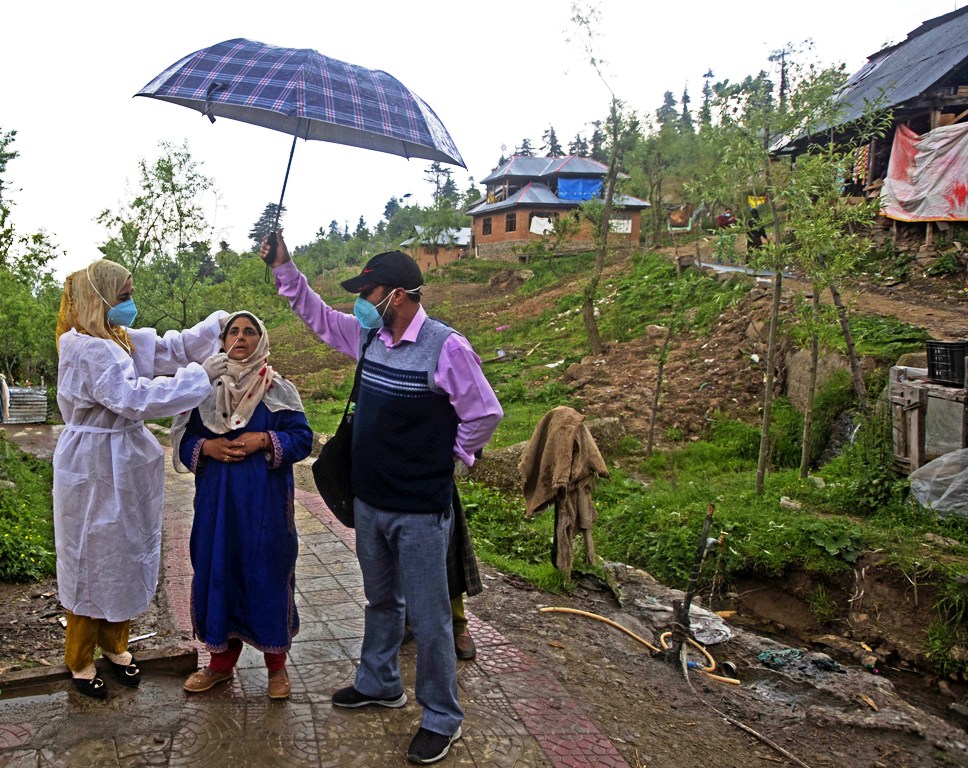
The viral load in Jammu and Kashmir is surging. However, the numbers are slightly lowering. From 52 thousand active cases across Jammu and Kashmir in the middle of May to now less than that, the infections are showing a decline. But this all is dictated by the lockdown.
Doctors and medical researchers, unlike administrators, have to deal with the disease only. They can acknowledge economic costs but not intervene, unlike the government. How are the doctors seeing the crisis and how they see an exit from it?
What is the current Covid19 situation?
Dr Mohammad Sultan Khuroo (former Director SKIMS) said Jammu and Kashmir is in obvious community spread. It will take nearly eight weeks to contain the second wave even if all the SOPs are strictly followed by the people.
“In such a situation, there is only one tool to tame the beast: the so-called lockdown. Of course, the administration has to evaluate its economic impact.”
Dr Muhammad Salim Khan (Head Community Medicine, GMC) believes the second wave is widespread and is affecting all age groups unlike in 2020.
“This year, the younger population and children are also having Covid-19 symptoms. This wave is sweeping across, affecting almost everyone, causing clusters within the families and community,” he said.
Dr Naveed Nazir, (Head Chest Disease Hospital) said the situation was alarming but there are still fewer deaths in comparison to the number of cases. Only 5-7 per cent of patients require critical care. The second wave is definitely affecting the younger generation.
“Also in the second wave, there is rapid progression. People who are asymptomatic turn into severe cases rapidly,” Naveed said. “In the first wave, the children used to be mostly asymptomatic but now they are also having symptoms, which are alarming.”
Dr Hardeep Singh, (Professor Medicine, GMC, Srinagar) said the second wave is highly contagious. “During the first wave, the affected person could infect only a few persons around him, but now the same person affects almost all persons around him which is a cause of great concern,” Dr Singh insisted.
Dr Kouser Sideeq, (Assistant Professor, GMC Baramulla) says Kashmir is “still manageable” as the healthcare system is still not overburdened. “In the first wave the cases were below thousand, but this time cases cross four thousand every day,” she said. The pandemic has a trend of its own. “In pandemic; you get the first wave because some people get affected then the virus takes some time, gets mutated, and once people see the cases have decreased they don’t follow the precautions anymore. This also gives enough time for the virus to again settle down in the community and then the cases again rise, giving birth to the second wave.” Dr Sideeq said.
Dr Zahid Ali Khan, (Assistant Professor GMC Baramulla) believes the situation in Kashmir is under control and there is nothing to worry about.
Dr Suhail Naik, till recently the president of Doctor’s Association Kashmir (DAK) terms the current situation as “difficult and worrisome” as the health care delivery system is overstretched and overburdened.
“Every district and sub-district hospital has now installed oxygen plants and backup oxygen concentrators and bulk cylinders,” Naik said, asserting the pandemic is like a third world war. The government and the public have to fight the invisible contagion jointly.
People, he said, must take Covid19 seriously and follow SOPs. The majority of the population is still susceptible.
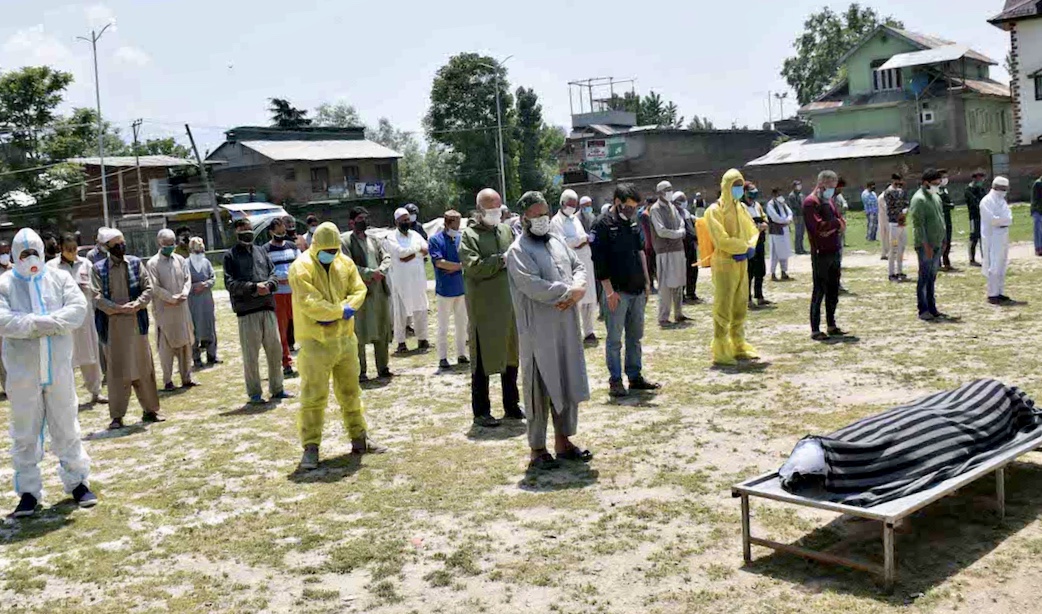
When Will Covid-2.0 Peak?
Dr Khuroo said that the peak in India is expected in the coming one or two weeks and in Jammu and Kashmir it is expected in the last week of May. “Cases will remain static for a few weeks and after that, there will be a decline.”
Dr Rafi Ahmad Jan, (Head Medicine SKIMS) said the situation hasn’t improved till. However, the lockdown will help improve the situation by mid-June.
Dr Suhail Naik asserts the peak cannot be predicted with certainty because a pandemic is unlike weather “where we can predict exact peaks like Sonam Lotus can do by measuring intensity and velocity of a western disturbance”. Pandemic, he said is a dynamic relationship between the behaviour of the virus and the people. “If people are following Covid-19 appropriate behaviour, the curve will flatten and vice versa.” The new mutated strains have very aggressive behaviour. “The virus is spreading to rural, border, and snow-bound areas as well.”
Dr Sideeq believes the peak would be assessed in the next few days.
Dr Zahid Ali Khan said Kashmir may have already reached its peak. The numbers are declining, he said.
What is the state of health infrastructure?
Dr Khuroo: “Health sector of every country comes under pressure in a pandemic. And as cases are being reported in Jammu and Kashmir our health sector is also under tremendous pressure.”
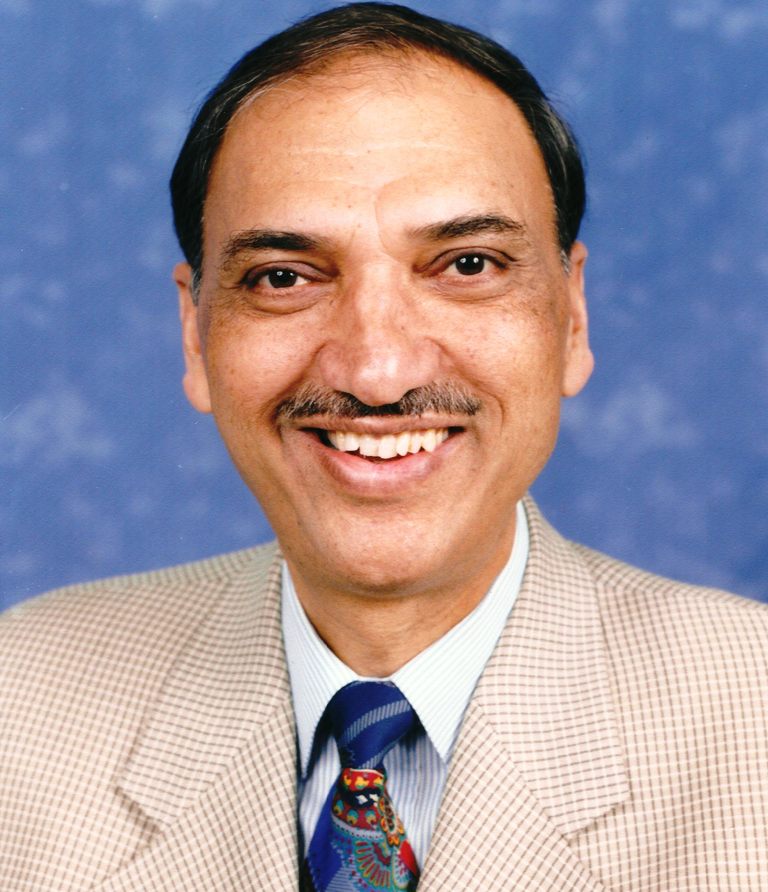
Dr Salim Khan said the health infrastructure and manpower is much better. “With the first wave, the health system was revamped and necessary measures were taken by the government to augment the infrastructure.”
Dr Suhail Naik said no infrastructure is optimal to fight this “dreaded” pandemic.“Every home has to function as a small hospital to tackle this pandemic,” he said, insisting the government has done the optimal level of preparation in the last year. “Believe me, administration and health care workers are working relentlessly, tirelessly, with consistency and dedication to mitigating the crisis. It is not an easy job to manage Covid and non-Covid emergencies along with public management of pandemics like testing, tracking, tracing, isolating, home management and mass vaccination.”
Dr Sideeq said the second wave is being properly managed. “We have many designated Covid hospitals and wards. Covid-care is given to the people of Kashmir properly and oxygen supply is also adequate. Many oxygen plants have been developed.”
Dr Khan: “If we can talk about the infrastructure for the present cases, that’s sufficient. If we even reach five thousand cases daily, we can manage them easily. Anything above 5000 daily cases will collapse our health infrastructure.”
What is the status of Oxygen supply?
Dr Rafi Ahmad Jan: “We have an adequate oxygen supply. Both the government and other concerned authorities are trying their best.”
Dr Naveed: “Many patients require high-flow oxygen. Every bed has an oxygen supply at the CD Hospital, and the plant supporting it has adequate capacity. Some patients who require more than 30 litres need to have extra cylinders which we are providing but sometimes transportation needs a bit of time.”
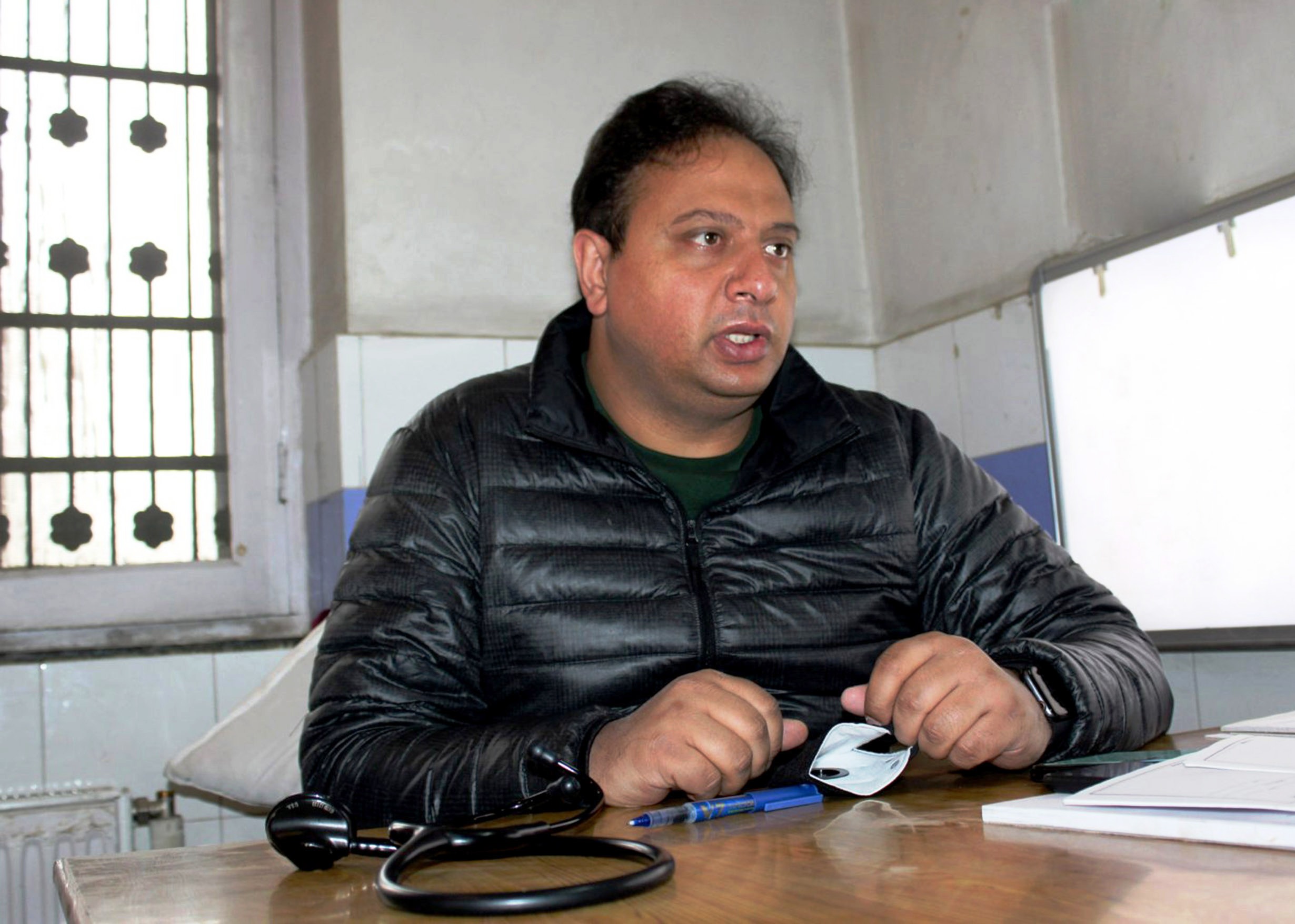
Dr Salim Khan: “The oxygenated bed capacity has also been considerably enhanced. As of now, there is no acute shortage of oxygen supply or essential medicines or equipment. However, the future trend of disease could not be predicted and its impact on the health system cannot be judged as of now. Therefore, there is a chance that beyond a particular load, the system can get compromised.” He asserted that the oxygen generation capacities at tertiary health care facilities have been increased manifold. New plants were installed at district and sub-district hospitals and sufficient numbers of ventilators were installed.
Dr Sideeq said that currently, the oxygen supply is all right.
Dr Khan: “We don’t lack the supply here.”
Dr Suhail Naik said that five years back not a single rural hospital was equipped with an oxygen plant. “All patients suffering from Chronic Obstructive Pulmonary Disease (COPD) with exaggeration of symptoms were referred to central hospitals just for two-litre per minute oxygen. In my view, this pandemic has resulted in expansion and up-gradation of equipment and oxygen plants across Jammu and Kashmir.” Even Sub District Hospital Kupwara is managing more than 50 patients because it has an oxygen plant.
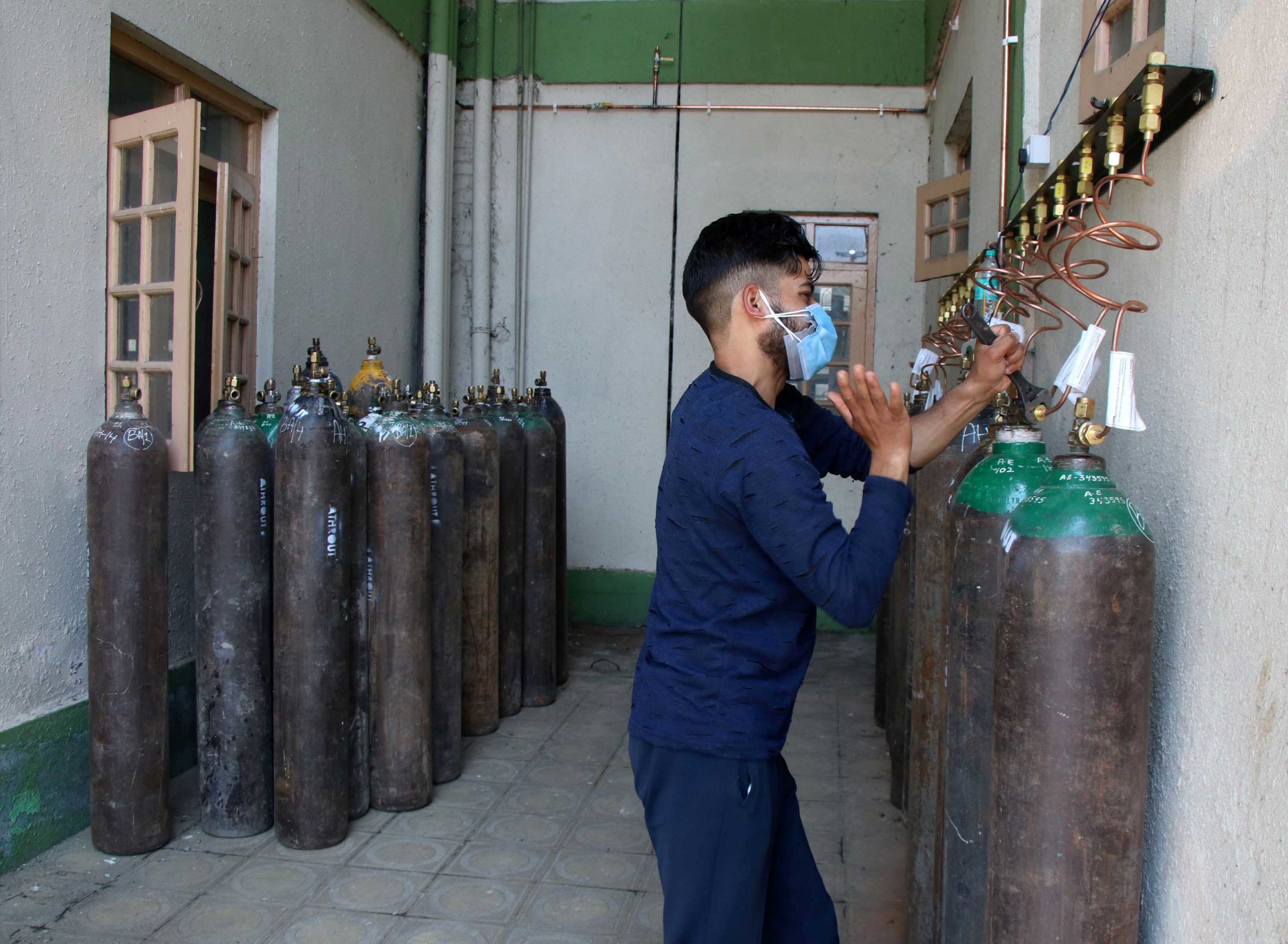
Are there new virus mutations in Kashmir?
Dr Khuroo said that the numbers of infections could nearly double to 10K if the lockdown was relaxed. He said that presently two mutations – UK mutation and Indian double mutation are prevalent in Jammu and Kashmir and both are spreading very fast and involving young people too.
“We are now witnessing that if a single member of a family becomes positive one day, the other day the whole family becomes positive as the pattern of the virus has changed and it has become super spreader,” Dr Khuroo said.
Dr Rafi Ahmad Jan: “When things are going so fast we do not know about variants.”
Dr Salim Khan: “Millions of mutations occur and only more virulent strains survive. That is why we are observing newer mutants being isolated regularly and there are hundreds of mutants of concern circulating this time.” He said these virulent mutants tend to have more invasive properties, evading immune response and spreading rapidly. “It is because of these characteristics, that more people are getting infected in a shorter span of time and consequently more people succumb to the virulent strains.”
The lowering of the guard, Dr Khan said helped the virus. “The public became complacent as if the pandemic had been won over and social, political, religious, recreational, and allied activities took the front role in the revival of the pre-COVID era. This gave the optimal opportunity for the mutating virus to invade the population with more severity.”
Dr Naveed: “In India, a double mutation has been reported. Wherever the nature of virus has changed, there has been a mutation.”
Dr Khan said in Jammu the news of the new variants is being reported. “It may affect Kashmir valley in coming days as the two divisions are interlinked.”
Dr Sideeq said the new variants are already in Kashmir. “The drastic rise in cases in just a span of a few days shows that the new variants may have come here. We have seen that in genomic sequencing, one variant of the triple mutant was here in Kashmir in patients admitted at the CD Hospital Srinagar,” she said. “I think there will be more variants that will come because it’s just going to be the peak of the second wave and not the end of Covid-19.”
Dr Suhail Naik: “Mutation can make virus very lethal and fatal, but on the other hand, it can also decrease its lethality and fatality depending on type and site of mutation.”
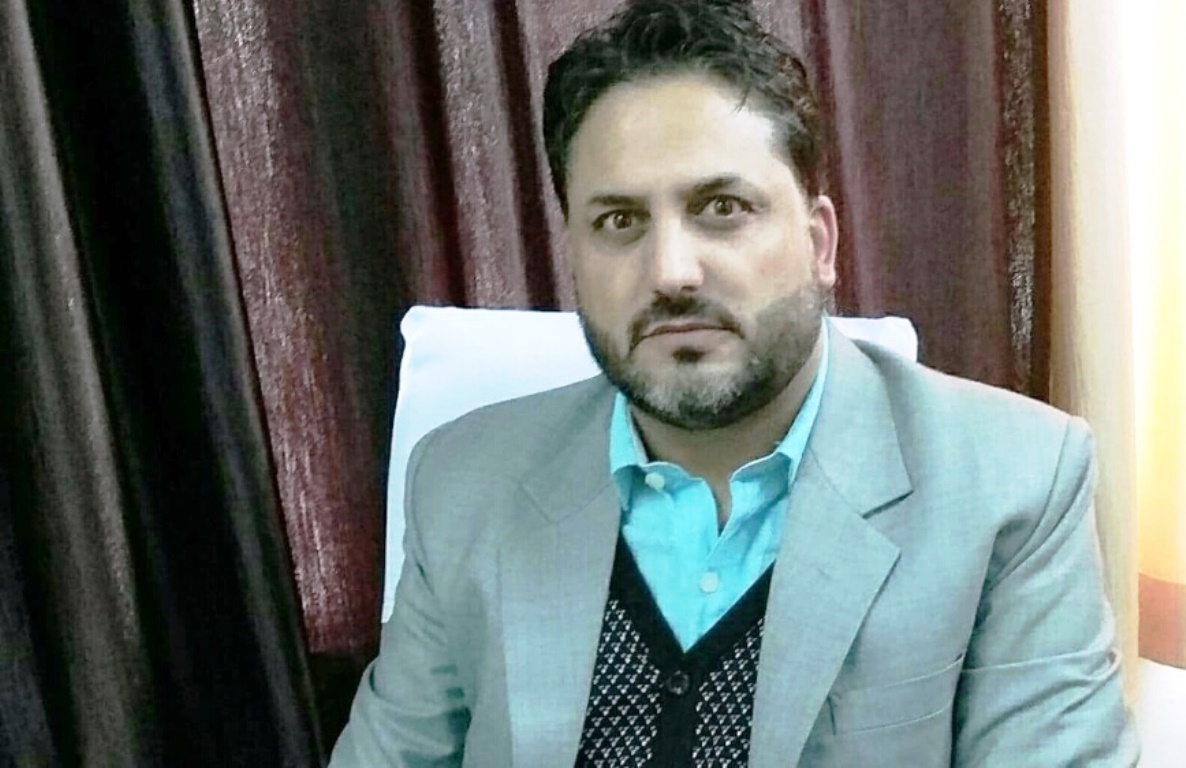
What is the way forward?
Dr Khuroo said while lockdown is mandatory to save lives, in the long run, it may not be as effective as the transmission of disease now happens within the household settings as well.
“Additional measures to curb this spread within houses need to be implemented. The virus as of now and its variants are extremely infectious and evasive. Lockdown measures for viruses with such behaviour have not been well worked up,” he said, suggesting the use of face masks inside the houses to protect the vulnerable.
“All forms of a gathering of diverse nature need to be identified and clear guidelines for their Covid19 status be circulated. There should be a testing programme for vendors, barbers, receptionists, butchers, and other people who interact with various people. This will reduce the transmission of disease at such points. Hospitals, nursing homes, and private clinics have become a big source of crowds and virus transmission.”
He said testing and tracing policy should be intensified and made more realistic. “Rapid testing should be limited to specific circumstances as recommended by the committee and the RT-PCR facility made more available and quicker.”
The top doctor said vaccine hesitancy needs to be fought and the vaccination programme must be strengthened and expanded. “This shall reduce infections and further mutations.”
Dr Khuroo said with variants that are more infectious and have immune evading properties, the role of the Covid19 vaccination programme in society needs to be redefined. “The fact is that vaccine-induced immunity may not give sterilizing immunity but can safeguard you from getting infections that need hospitalization and/or serious lung disease and death. So, implementation of Covid19 appropriate behaviour and vaccination shall reduce the occurrence of infections. Once virus replication is reduced, the occurrence of variants is also inhibited.”
Dr Salim Khan said that the priority is to deal professionally with the current wave to reduce morbidity and mortality by ensuring no gatherings of any sort, strict implementation of lockdowns or restrictions wherever applicable.
“However, the pandemic may not die down with this second wave. I think the government shall form a special task force of experts who would conduct a situation analysis of existing infrastructure, propose an augmentation of infrastructure and equipment, and strengthen manpower so that we are very well prepared to face the third wave,” Khan said, adding that the highest emphasis should be on universal immunization of the population to build herd immunity.
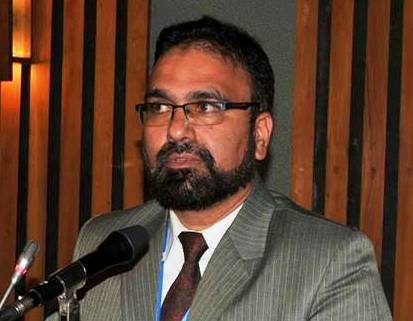
Dr Naveed Nazir said that lockdown isn’t a permanent solution to deal with Covid19. “It will decrease the number of cases and break the chain,” he said. “Eventually, Covid19 will become endemic like other flu’s but till then people need to follow SOPs strictly.”
Dr Sideeq said that people must remember that Covid19 is going to stay on forever. “It will not vanish completely. This year a third wave is going to come after which there will be a decrease but still the disease will stay,” She said. She said that for this at least people have to follow all of the SOPs. “Vaccinations will play a vital role to control the virus.”
(Saifullah Bashir and Aqib Nazir contributed to this story)















